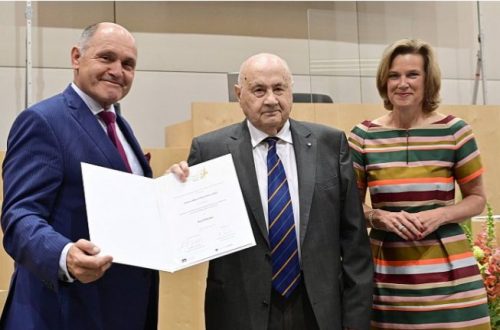Guest post by Karl Pfeifer
Freedom of speech in Hungary has all too often become a freedom for Nazi-speech, which is sometimes defended by the very people it attacks and seeks to destroy– as the story of Hungarian politician Miklós Gáspár Tamás shows. Tamás began as a Marxist, became a Liberal and MP of the Liberal SZDSZ party from 1990 until 1994, returned to Marxism again and is now one of the leaders of a small left-wing group.
Two main ideologies compete in Hungary today: that of the extreme right-wing party Jobbik, which is openly antisemitic, anti-Roma and anti-gay, and that of the ruling party Fidesz, which considers itself a party of the middle pretending to combat antisemitism, while hosting and protecting violently antsemitic personalities.
Tamás was a fervent, if not dogmatic, believer in free speech during his time as influential MP of the SDSZ. When his liberal party was attacked as “Jewish” and “cosmopolitan” by the conservative government-party MDF, Tamás, the son of a Jewish mother, stressed his Christian identity. And he steadfastly declined to attack antisemites– because of his commitment to “intellectual freedom.” He was less tolerant when Budapest Rabbi György Landeszmann committed a famous gaffe in February 1993 by publicly stating (after many provocative questions) that there would not be any Hungarian culture without the Jews.
Miklós Gáspár Tamás– who had declared in March 1992: “We must protect every party, every thought, even those we feel to be unsupportable”– one year later called Dr. Landeszmann, the former head of the Jewish archives of Hungary, “a stupid and mischievous Hungarian citizen […] who has read nothing since his A-levels.” He then went on (and I translate only his less vitriolic remarks): “Considering the idiotic statements by Mr. Landeszmann, more short-tempered people than me might be tempted to say: ‘If Mr. Chief Rabbi is so displeased with us, why don’t we ask him, with blushing face and trembling lids, to kindly emigrate to Israel.’ […] How could the Jews, an allegedly wise people […] charge Landeszmann with the leadership of their community?”
Yet when István Csurka, one of the Hungary’s most outspoken and influential antisemites, died recently Tamás published a long obituary in a liberal weekly. While not denying Csurka’s fierce antisemitism, Tamás stated: “[Csurka] was not a Nazi in the sense of Jobbik [the ultra-right-wingers], a party that does not really care about the Hungarian people. […] May he rest in peace, he was not the worst.”
Neither as a Marxist, nor as a Liberal, nor as a born-again-Marxist did Miklós Gáspár Tamás ever seem to have understood the central position of antisemitism in nationalistic Hungarian ideology. He even slips occasionally into antisemitic remarks himself. I presume he is driven by a compulsive urge to be recognized as a “Real Hungarian” by the “National Hungarian” community. This is not likely to happen.


